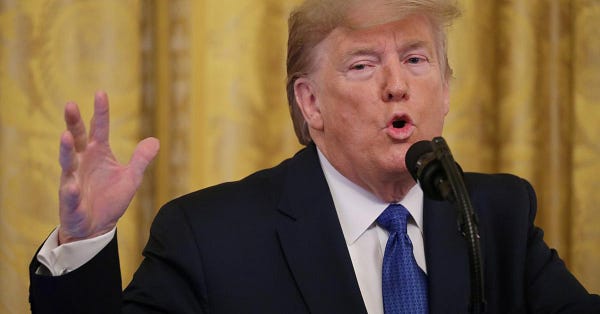President Trump bans travel from Nigeria, Tanzania, Sudan, and Eritrea
Issue No. 3: January 2020
Good Evening,
Hope your new year has been going well! The wintry weather in New York has your girl huddled up in layers.

But alas, such is life in the city where dreams are made of.
January’s Top Story:
The Trump Administration announced today six countries, including Nigeria, Sudan, Tanzania, and Eritrea, will be added to the list of nations which will face higher levels of travel restrictions to the United States.
Under the new “travel ban,” the New York Times reports immigration visas for Nigerians and Eritreans looking to settle in the U.S., as well as diversity visas, - a lottery system which selects underrepresented national groups for a chance to immigrate to the United States - from Tanzania and Sudan, will all be banned. People from the countries affected under the new ban will largely still be allowed to visit the U.S., but will not be allowed to settle permanently in the country. For a breakdown of how the new measure will affect travel from each African country, check out Nicole Narea’s great reporting for Vox here.
Critics of the policy, including Rep. Joe Neguse, an Eritrean-American Congressman from Colorado, have called out the ban as xenophobic, saying:
“When one considers the nature of the first travel ban — the Muslim ban — and the president’s comments about African countries, it’s hard not to come away with the conclusion that these bans are discriminatory.”
Since the news broke earlier this evening, reactions have also poured in from several Democratic presidential candidates, including Sen. Elizabeth Warren and Joe Biden, as well as the Speaker of the House, Nancy Pelosi.



The new travel ban comes amid a strained relationship between President Trump and African communities after the president referred to African nations as “S— hole” countries during a White House meeting in 2018. The comments sparked an outcry across the world, leading to a response by Ghana’s President, Nana Akuffo-Addo.

Do you expect more African countries to be added to the list? How do you think Nigeria’s President Buhari will respond? Send me a note to chat!
Other things that happened in January:
Three years after his loss of power and self-exile into neighboring Equatorial Guinea, The Gambia’s decades-long dictator, Yahya Jammeh is reportedly looking to return back home. This news comes along the West African country’s broadcasts of “truth and reconciliation” hearings detailing abuses committed by the former President during his 22-year reign.
A proposal by the Trump Administration to slash the presence of American troops in the Sahel and the Horn of Africa has received pushback from lawmakers in the United States, and the U.S.’s European allies in the fight against extremism.
Umaro Cissoko Embalo, the former Prime Minister of Guinea-Bissau and ex-army general, won the country’s presidential election late last month with 53% of the vote. Following the election, the Supreme Court of the West African country quickly dismissed fraud charges levied against the new President by his political opponent.
My recommended reads from January:
Did Isabel dos Santos’ status as the richest women in Africa ever appear clean to anyone? “Perhaps the most frustrating part of all of this, however, is that the world knew,” writes Claudia Gastrow on the saga over the investigations into Isabel’s appointment to a state-held oil monopoly in Angola, her alleged embezzlement of state funds, and the international institutions who’ve helped prop up dos Santos’ image as a legitimate businessperson.
In Foreign Policy, Tom Gardner chronicles the moments which led up to the downfall of Ethiopia’s longstanding governing party, the Ethiopian People’s Revolutionary Democratic Front.
A year ago, President Bio famously declared a “national emergency” on rape in Sierra Leone. In The Conversation, academics Laura Martin and Simeon Koroma look at the policy missteps which followed the government declaration, and the structural challenges that continue to be a hinderance for bringing assailants to justice in the West African country.
For over nine decades, Firestone tires has cemented itself as an integral part of Liberia’s economy by reigning as the country’s largest private employer. But over the past few months, the Washington Post’s Danielle Paquette writes the company has moved rapidly to lay off local workers, leading to controversial measures which have led spectators to ask the question: “What do global titans owe their most vulnerable workers?”
Song of the month:
This month’s selection comes from Tiffany Zoe (Liberia), who has chosen “Sura Yako” by Kenyan artist Sauti Sol.
Have a blessed month! See you at the end of February.


